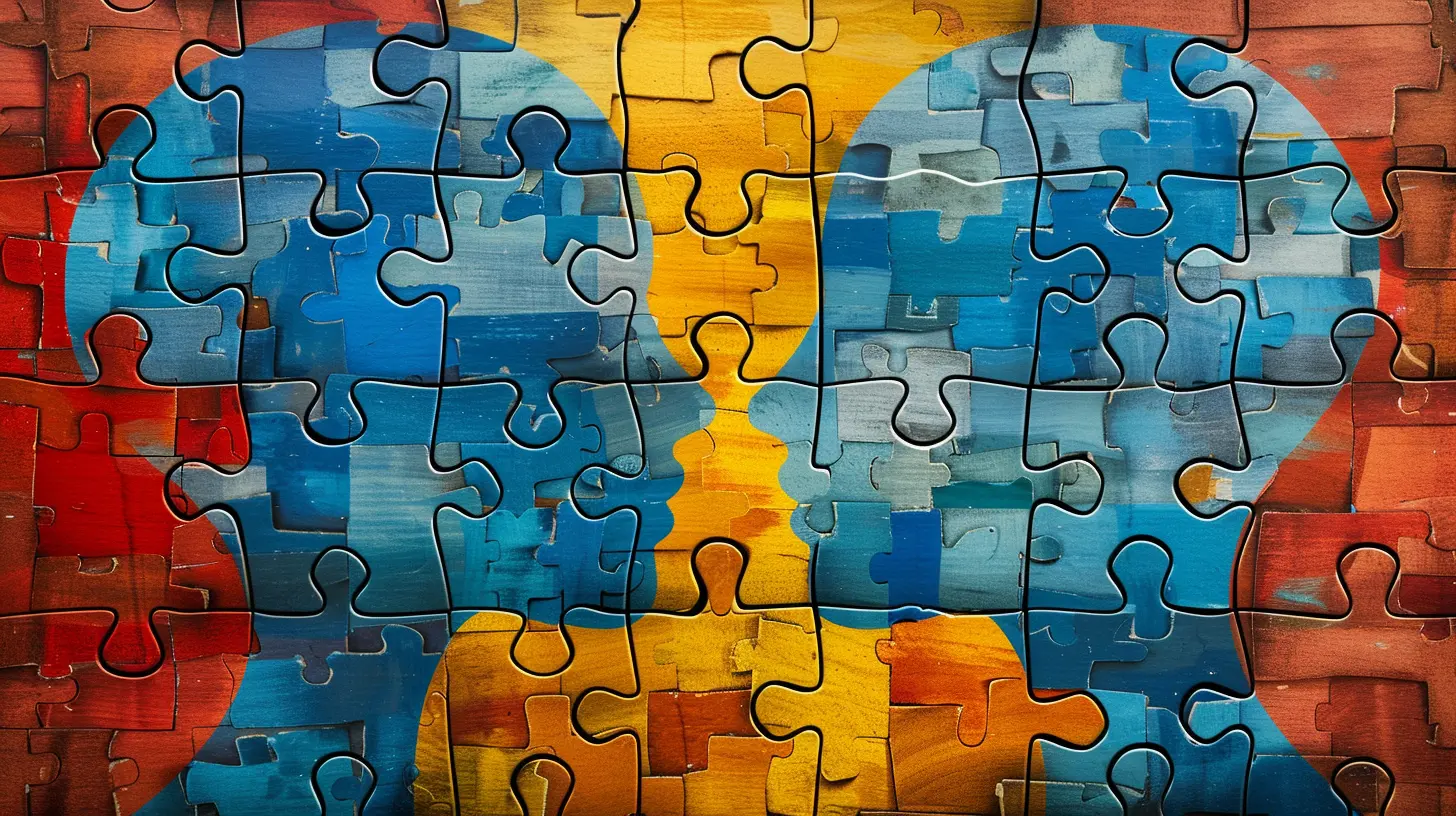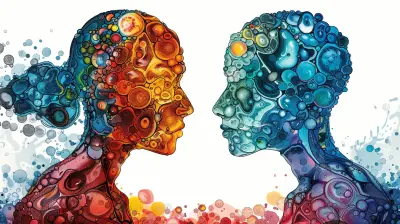How Attachment Theory Informs Clinical Psychology
19 December 2024
Attachment theory—ever heard of it? If not, buckle up, because this psychological concept is more than just an academic term. It's a framework that helps explain how humans form emotional bonds and, believe it or not, it plays a pivotal role in how clinical psychologists approach therapy today. From our earliest relationships with caregivers to the way we handle adult connections, attachment theory is a lens through which therapists can better understand and help their clients.
In this article, we’ll dive deep into how attachment theory informs clinical psychology. We’ll explore its origins, its relevance in therapy, and how it can influence everything from diagnosing disorders to healing emotional wounds. Ready? Let’s get started.

What is Attachment Theory?
Before we dive into the nitty-gritty of clinical psychology, let's cover the basics. Attachment theory is a psychological model that describes the dynamics of long-term relationships. It was first developed by John Bowlby in the 1950s. Bowlby was particularly interested in the bond between infants and their primary caregivers—often their mothers—and how that bond affected the child's emotional and social development.In short, attachment theory suggests that the way we are cared for as infants shapes how we form relationships throughout our lives. Sounds simple, right? But like most things in psychology, it’s more complex than it seems.
The Four Attachment Styles
Bowlby’s work was expanded upon by Mary Ainsworth, who identified four main attachment styles:1. Secure Attachment: People with a secure attachment style feel confident in their relationships. They trust others and feel comfortable relying on them, but they’re also okay with independence.
2. Anxious Attachment: Those with an anxious attachment style often crave closeness but fear abandonment. They may become overly dependent on their partners, seeking constant validation.
3. Avoidant Attachment: People with an avoidant attachment style tend to distance themselves from others. They might be emotionally unavailable and prioritize independence over intimacy.
4. Disorganized Attachment: This style is a mix of anxious and avoidant behaviors and is often associated with trauma or inconsistent caregiving in early life.
These attachment styles don’t just affect romantic relationships—they also influence friendships, work relationships, and even how we see ourselves. And here’s where clinical psychology comes in.

How Attachment Theory Fits Into Clinical Psychology
Now that we have a grasp on what attachment theory is, how does it inform clinical psychology? Well, therapists use attachment theory as a tool to understand their clients' behavior, emotional struggles, and relationship dynamics. By identifying a client’s attachment style, clinicians can tailor their therapeutic approach to meet the individual’s emotional needs.Understanding Clients’ Backgrounds
One of the first things psychologists and therapists do in a clinical setting is gather information about the client’s past. Attachment theory provides a framework for understanding how early life experiences, particularly relationships with caregivers, shape who a person becomes.For example, someone with a secure attachment style might have had a supportive and nurturing childhood. In contrast, someone with an anxious attachment style might have experienced inconsistent caregiving, leading to adult relationships filled with insecurity and fear of abandonment.
Identifying these patterns can give therapists insight into why clients behave the way they do, helping them target the root cause of emotional issues rather than just treating the symptoms.
Attachment Theory and Mental Health Disorders
Attachment theory doesn’t just help clinicians understand relationships—it also has a direct link to mental health disorders. Research suggests that insecure attachment styles (anxious, avoidant, and disorganized) are associated with various psychological disorders, including:- Anxiety Disorders
- Depression
- Borderline Personality Disorder (BPD)
- Post-Traumatic Stress Disorder (PTSD)
- Eating Disorders
For instance, people with anxious attachment styles may be more prone to anxiety and depression because of their deep-rooted fears of rejection and abandonment. Meanwhile, those with avoidant attachment styles might struggle with emotional intimacy, leading to feelings of isolation and loneliness, which can manifest as depressive symptoms.
Having this understanding allows clinicians to not only diagnose these disorders more accurately but also provides a roadmap for treatment.
Tailoring Therapy to Attachment Styles
Attachment theory offers clinicians a way to customize their therapeutic approach based on the client’s attachment style. This personalization can make therapy more effective because it addresses the client’s unique emotional needs.Secure Attachment
Clients with secure attachment styles are generally better at managing emotions and relationships. Therapy for these individuals might focus on fine-tuning their coping mechanisms or navigating specific life challenges, like career changes or grief.Anxious Attachment
For clients with an anxious attachment style, therapy often focuses on building self-worth and establishing healthy boundaries. These individuals may need reassurance and validation, so therapists work on helping them develop a sense of internal security rather than relying on others for emotional stability.Avoidant Attachment
Clients with avoidant attachment styles may struggle with vulnerability and emotional expression. In therapy, these individuals are encouraged to open up and explore their emotions in a safe space. Therapists may work on breaking down emotional walls and helping the client feel comfortable with intimacy.Disorganized Attachment
Disorganized attachment usually stems from trauma or neglect, making therapy more complex. These clients may exhibit erratic behaviors, and therapy often involves trauma-informed care to provide a safe environment for healing. The therapist may focus on building trust and helping the client process past traumas in a manageable way.The Role of the Therapeutic Relationship
The relationship between therapist and client is crucial in any form of therapy, but it takes on even greater significance when viewed through the lens of attachment theory. In many ways, the therapist becomes a "secure base" for the client, offering a safe space where they can explore difficult emotions and experiences.For clients with insecure attachment styles, the therapeutic relationship itself can be healing. The therapist provides consistent, non-judgmental support, which helps the client develop a sense of trust and emotional safety—something they may not have experienced in their early relationships.
In this way, therapy can essentially "re-wire" a person’s attachment style, helping them move from insecure to secure attachment. It’s a slow process, but one that can lead to significant improvements in the client’s emotional well-being and relationships.

Real-World Applications of Attachment Theory in Therapy
Now you might be wondering, “How does attachment theory work in actual therapy sessions?” Well, it’s not like therapists hold up a chart of attachment styles and ask, “Which one are you?” Instead, they use attachment theory as a backdrop for understanding the client’s emotional world.Cognitive Behavioral Therapy (CBT) and Attachment
Cognitive Behavioral Therapy (CBT) is one of the most common therapy methods, and it’s often used alongside attachment theory. CBT helps clients identify and change negative thought patterns, and when combined with attachment theory, it can help clients reframe their approach to relationships.For example, someone with an anxious attachment style might have thoughts like, "If my partner doesn’t text me back right away, they don’t care about me." A therapist might help that person challenge this assumption and develop healthier, more secure ways of thinking about their relationships.
Emotionally Focused Therapy (EFT) and Attachment
Emotionally Focused Therapy (EFT) is specifically designed for couples and is heavily based on attachment theory. In EFT, the therapist helps couples identify their attachment needs and fears, encouraging them to express these emotions openly to their partner. By doing so, they can create a stronger, more secure bond.Attachment-Focused Family Therapy
Family therapy often uses attachment theory to address issues between parents and children. For instance, a parent might learn how their own attachment style is influencing their relationship with their child, and how they can make adjustments to foster a more secure attachment.
Conclusion: Why Attachment Theory Matters in Clinical Psychology
Attachment theory isn’t just some abstract concept—it’s a powerful tool that informs many aspects of clinical psychology. From diagnosing mental health disorders to tailoring therapeutic approaches, this theory helps clinicians understand the profound impact that early relationships have on a person’s emotional life.By identifying a client’s attachment style, therapists can offer more targeted, effective treatment that goes beyond surface-level symptoms. And perhaps most importantly, attachment theory reminds us that the way we relate to others is deeply rooted in our earliest experiences, but with the right support, healing and change are always possible.
all images in this post were generated using AI tools
Category:
Clinical PsychologyAuthor:

Alexandra Butler
Discussion
rate this article
14 comments
Patricia Wheeler
This article insightfully articulates how attachment theory serves as a foundational framework in clinical psychology, emphasizing its role in understanding client relationships and therapeutic dynamics. By integrating attachment styles into practice, clinicians can enhance empathy and tailor interventions, ultimately fostering deeper emotional healing and stronger therapeutic alliances.
February 9, 2025 at 5:48 AM

Alexandra Butler
Thank you for your insightful comment! I'm glad you found the article emphasizes the importance of attachment theory in enhancing client relationships and therapeutic dynamics.
Lanae Roberson
Attachment theory: the emotional glue in our clinical puzzle!
February 1, 2025 at 5:56 PM

Alexandra Butler
Thank you! Attachment theory truly serves as a crucial framework for understanding and addressing the emotional dynamics in clinical settings.
Kairo McAnally
This article effectively illustrates the importance of attachment theory in clinical psychology, highlighting its impact on therapeutic relationships and patient outcomes. Great insights!
January 29, 2025 at 4:27 AM

Alexandra Butler
Thank you for your thoughtful feedback! I'm glad you found the insights on attachment theory's significance in clinical practice valuable.
Selkie McCallum
Attachment theory isn't just academic; it's the heartbeat of clinical psychology. Understanding our connections transforms therapy, unveils deep-seated patterns, and empowers healing. Embrace this foundational approach—it's time to redefine relationships and revolutionize mental health treatment.
January 23, 2025 at 5:13 PM

Alexandra Butler
Thank you for highlighting the profound impact of attachment theory in clinical psychology. It's indeed a vital framework that enriches our understanding of relationships and enhances therapeutic practice.
Cassian Harper
Attachment theory: because understanding our emotional baggage helps us pack lighter for life’s therapy trips!
January 20, 2025 at 4:56 PM

Alexandra Butler
Thank you! Understanding attachment theory truly empowers us to navigate our emotional landscapes and facilitates healing.
Zevros Blair
This article beautifully highlights the importance of attachment theory in understanding our relationships. It's fascinating how our early bonds shape our mental health and therapeutic approaches. A must-read for anyone curious about human connection!
January 16, 2025 at 3:34 AM

Alexandra Butler
Thank you for your thoughtful comment! I'm glad you found the article insightful. Understanding attachment theory truly is essential for deepening our knowledge of relationships and therapeutic practices.
Carrie Curry
Understanding attachment theory empowers us to foster deeper connections and healing in clinical psychology. Embrace the journey of growth and transformation in yourself and others!
January 13, 2025 at 6:09 AM

Alexandra Butler
Thank you for your insightful comment! Embracing attachment theory indeed enhances our understanding of relationships, facilitating growth and healing in therapeutic practice.
Chantal Smith
Insightful article! Attachment theory truly enhances our understanding of psychology.
January 8, 2025 at 4:55 AM

Alexandra Butler
Thank you! I'm glad you found the article insightful. Attachment theory indeed plays a crucial role in understanding psychological dynamics.
Rook McQuillan
Great insights on attachment's impact!
January 1, 2025 at 3:47 AM

Alexandra Butler
Thank you! I'm glad you found it insightful!
Cambria Frye
Fascinating how attachment shapes therapeutic relationships! What insights can we gain?
December 27, 2024 at 3:48 PM

Alexandra Butler
Attachment theory offers valuable insights into understanding client-therapist dynamics, emphasizing the importance of secure attachments for fostering trust, empathy, and effective communication in therapy. By recognizing attachment styles, therapists can tailor their approaches to meet clients' emotional needs more effectively.
Fenn Kirkpatrick
Attachment theory in clinical psychology? Groundbreaking! It’s like discovering the secret ingredient in grandma’s famous recipe. But seriously, if understanding our emotional baggage helps us unpack it, count me in. Let’s get those childhood issues sorted once and for all!
December 25, 2024 at 4:45 AM

Alexandra Butler
Thank you! Understanding attachment theory truly does help us unravel and address our emotional baggage, paving the way for healing and growth. I'm glad you're on board!
Zephyrine Jimenez
Thank you for this insightful article. The exploration of attachment theory's relevance to clinical psychology enhances our understanding of client relationships and therapeutic practices. I appreciate the depth of analysis and practical implications presented.
December 22, 2024 at 4:28 AM

Alexandra Butler
Thank you for your kind words! I'm glad you found the article insightful and relevant to clinical practice. Your feedback is much appreciated!
Antonia Vance
Understanding attachment deepens healing and connection in therapy.
December 20, 2024 at 4:41 PM

Alexandra Butler
Absolutely! Understanding attachment is fundamental in therapy, as it fosters deeper healing and strengthens the therapeutic relationship.
Camille McCracken
Attachment theory in clinical psychology? Sounds like the perfect excuse for my therapist to cuddle with me! Just kidding—hopefully, my attachment style doesn’t come with extra baggage. Maybe I’ll just attach myself to some snacks instead during our sessions. 🍕🛋️
December 20, 2024 at 5:02 AM

Alexandra Butler
Haha, love the humor! While cuddling isn’t part of the therapy process, understanding your attachment style can definitely help navigate emotional connections—snacks included! 🍕😊
MORE POSTS

The Power of Mindfulness in Cultivating Daily Joy

Self-Compassion: The Foundation of Emotional Intelligence

The Role of Gender Roles in Modern Relationships

The Psychology of Color: How It Affects Mood and Behavior

Why Arguments Can Be Healthy for Your Relationship

Why Empathy Is Essential for Emotional Intelligence

The Connection Between Personality Disorders and Eating Disorders

Understanding the Psychology of Procrastination

The Power of Visualization in Goal Setting and Achievement